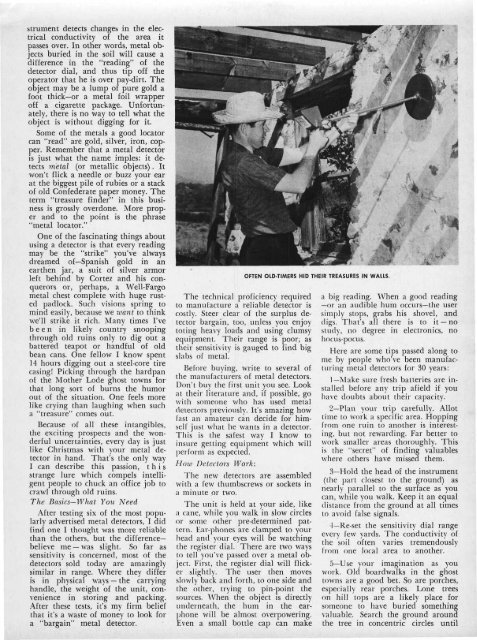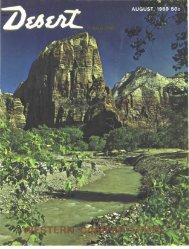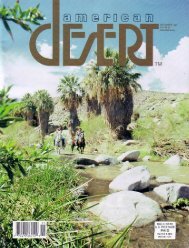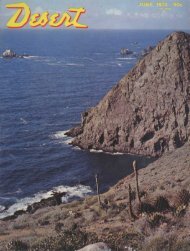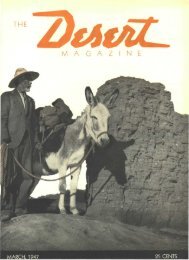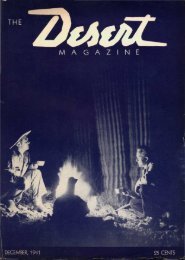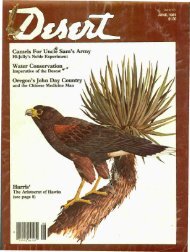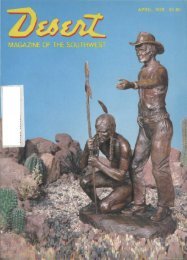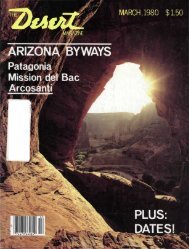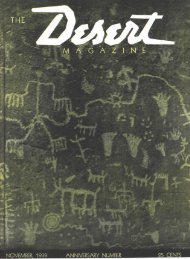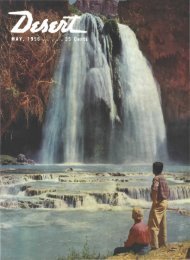randall henderson petroglyphs - Desert Magazine of the Southwest
randall henderson petroglyphs - Desert Magazine of the Southwest
randall henderson petroglyphs - Desert Magazine of the Southwest
You also want an ePaper? Increase the reach of your titles
YUMPU automatically turns print PDFs into web optimized ePapers that Google loves.
strument detects changes in <strong>the</strong> electrical<br />
conductivity <strong>of</strong> <strong>the</strong> area it<br />
passes over. In o<strong>the</strong>r words, metal objects<br />
buried in <strong>the</strong> soil will cause a<br />
difference in <strong>the</strong> "reading" <strong>of</strong> <strong>the</strong><br />
detector dial, and thus tip <strong>of</strong>f <strong>the</strong><br />
operator that he is over pay-dirt. The<br />
object may be a lump <strong>of</strong> pure gold a<br />
foot thick—or a metal foil wrapper<br />
<strong>of</strong>f a cigarette package. Unfortunately,<br />
<strong>the</strong>re is no way to tell what <strong>the</strong><br />
object is without digging for it.<br />
Some <strong>of</strong> <strong>the</strong> metals a good locator<br />
can "read" are gold, silver, iron, copper.<br />
Remember that a metal detector<br />
is just what <strong>the</strong> name imples: it detects<br />
metal (or metallic objects). It<br />
won't flick a needle or buzz your ear<br />
at <strong>the</strong> biggest pile <strong>of</strong> rubies or a stack<br />
<strong>of</strong> old Confederate paper money. The<br />
term "treasure finder" in this business<br />
is grossly overdone. More proper<br />
and to <strong>the</strong> point is <strong>the</strong> phrase<br />
"metal locator."<br />
One <strong>of</strong> <strong>the</strong> fascinating things about<br />
using a detector is that every reading<br />
may be <strong>the</strong> "strike" you've always<br />
dreamed <strong>of</strong>—Spanish gold in an<br />
ear<strong>the</strong>n jar, a suit <strong>of</strong> silver armor<br />
left behind by Cortez and his conquerors<br />
or, perhaps, a Well-Fargo<br />
metal chest complete with huge rusted<br />
padlock. Such visions spring to<br />
mind easily, because we want to think<br />
we'll strike it rich. Many times I've<br />
been in likely country snooping<br />
through old ruins only to dig out a<br />
battered teapot or handful <strong>of</strong> old<br />
bean cans. One fellow I know spent<br />
14 hours digging out a steel-core tire<br />
casing! Picking through <strong>the</strong> hardpan<br />
<strong>of</strong> <strong>the</strong> Mo<strong>the</strong>r Lode ghost towns for<br />
that long sort <strong>of</strong> burns <strong>the</strong> humor<br />
out <strong>of</strong> <strong>the</strong> situation. One feels more<br />
like crying than laughing when such<br />
a "treasure" comes out.<br />
Because <strong>of</strong> all <strong>the</strong>se intangibles,<br />
<strong>the</strong> exciting prospects and <strong>the</strong> wonderful<br />
uncertainties, every day is just<br />
like Christmas with your metal detector<br />
in hand. That's <strong>the</strong> only way<br />
I can describe this passion, this<br />
strange lure which compels intelligent<br />
people to chuck an <strong>of</strong>fice job to<br />
crawl through old ruins.<br />
The Basics—What You Need<br />
After testing six <strong>of</strong> <strong>the</strong> most popularly<br />
advertised metal detectors, I did<br />
find one I thought was more reliable<br />
than <strong>the</strong> o<strong>the</strong>rs, but <strong>the</strong> differencebelieve<br />
me — was slight. So far as<br />
sensitivity is concerned, most <strong>of</strong> <strong>the</strong><br />
detectors sold today are amazingly<br />
similar in range. Where <strong>the</strong>y differ<br />
is in physical ways — <strong>the</strong> carrying<br />
handle, <strong>the</strong> weight <strong>of</strong> <strong>the</strong> unit, convenience<br />
in storing and packing.<br />
After <strong>the</strong>se tests, it's my firm belief<br />
that it's a waste <strong>of</strong> money to look for<br />
a "bargain" metal detector.<br />
The technical pr<strong>of</strong>iciency required<br />
to manufacture a reliable detector is<br />
costly. Steer clear <strong>of</strong> <strong>the</strong> surplus detector<br />
bargain, too, unless you enjoy<br />
toting heavy loads and using clumsy<br />
equipment. Their range is poor, as<br />
<strong>the</strong>ir sensitivity is gauged to find big<br />
slabs <strong>of</strong> metal.<br />
Before buying, write to several <strong>of</strong><br />
<strong>the</strong> manufacturers <strong>of</strong> metal detectors.<br />
Don't buy <strong>the</strong> first unit you see. Look<br />
at <strong>the</strong>ir literature and, if possible, go<br />
with someone who has used metal<br />
detectors previously. It's amazing how<br />
fast an amateur can decide for himself<br />
just what he wants in a detector.<br />
This is <strong>the</strong> safest way I know to<br />
insure getting equipment which will<br />
perform as expected.<br />
How Detectors Work:<br />
The new detectors are assembled<br />
with a few thumbscrews or sockets in<br />
a minute or two.<br />
The unit is held at your side, like<br />
a cane, while you walk in slow circles<br />
or some o<strong>the</strong>r pre-determined pattern.<br />
Ear-phones are clamped to your<br />
head and your eyes will be watching<br />
<strong>the</strong> register dial. There are two ways<br />
to tell you've passed over a metal object.<br />
First, <strong>the</strong> register dial will flicker<br />
slightly. The user <strong>the</strong>n moves<br />
slowly back and forth, to one side and<br />
<strong>the</strong> o<strong>the</strong>r, trying to pin-point <strong>the</strong><br />
sources. When <strong>the</strong> object is directly<br />
underneath, <strong>the</strong> hum in <strong>the</strong> earphone<br />
will be almost overpowering.<br />
Even a small bottle cap can make<br />
OFTEN OLD-TIMERS HID THEIR TREASURES IN WALLS.<br />
a big reading. When a good reading<br />
—or an audible hum occurs—<strong>the</strong> user<br />
simply stops, grabs his shovel, and<br />
digs. That's all <strong>the</strong>re is to it — no<br />
study, no degree in electronics, no<br />
hocus-pocus.<br />
Here are some tips passed along to<br />
me by people who've been manufacturing<br />
metal detectors for 30 years:<br />
1—Make sure fresh batteries are installed<br />
before any trip afield if you<br />
have doubts about <strong>the</strong>ir capacity.<br />
2—Plan your trip carefully. Allot<br />
time to work a specific area. Hopping<br />
from one ruin to ano<strong>the</strong>r is interesting,<br />
but not rewarding. Far better to<br />
work smaller areas thoroughly. This<br />
is <strong>the</strong> "secret" <strong>of</strong> finding valuables<br />
where o<strong>the</strong>rs have missed <strong>the</strong>m.<br />
3—Hold <strong>the</strong> head <strong>of</strong> <strong>the</strong> instrument<br />
(<strong>the</strong> part closest to <strong>the</strong> ground) as<br />
nearly parallel to <strong>the</strong> surface as you<br />
can, while you walk. Keep it an equal<br />
distance from <strong>the</strong> ground at all times<br />
to avoid false signals.<br />
4—Re-set <strong>the</strong> sensitivity dial range<br />
every few yards. The conductivity <strong>of</strong><br />
<strong>the</strong> soil <strong>of</strong>ten varies tremendously<br />
from one local area to ano<strong>the</strong>r.<br />
5—Use your imagination as you<br />
work. Old boardwalks in <strong>the</strong> ghost<br />
towns are a good bet. So are porches,<br />
especially rear porches. Lone trees<br />
on hill lops are a likely place for<br />
someone to have buried something<br />
valuable. Search <strong>the</strong> ground around<br />
<strong>the</strong> tree in concentric circles until


